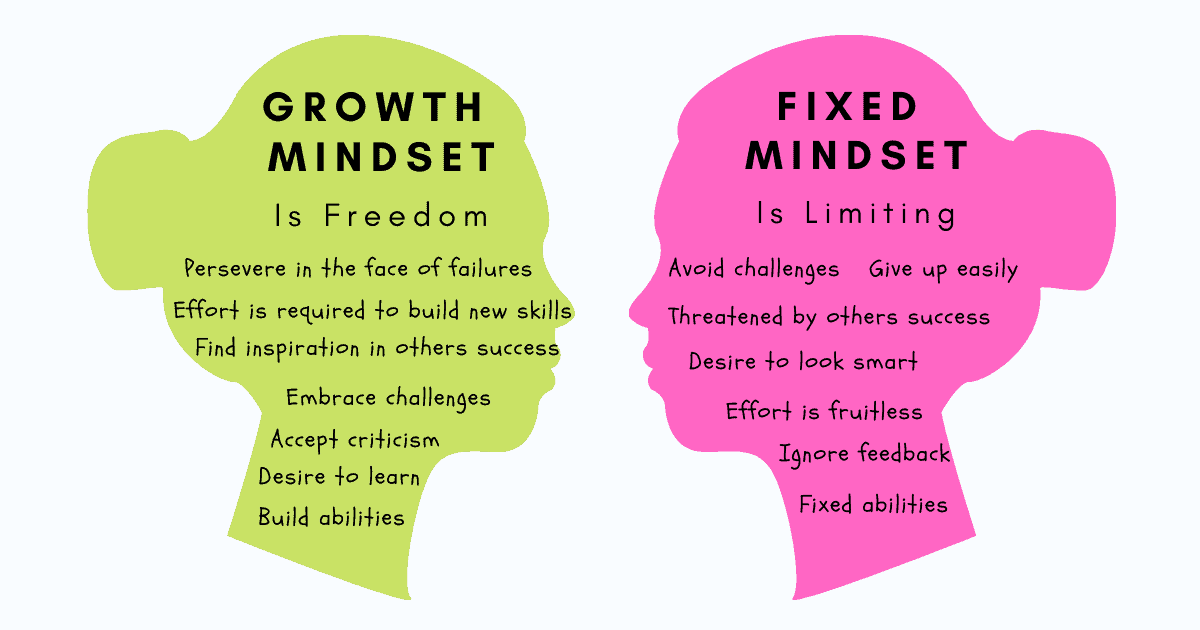“Follow your passion, success will follow you.” Surely this saying is no stranger to us. It encourages you to stick to your goals and not give up your passion, but it doesn’t show you how to. Other than self-help sayings that are somewhat promotional, a study by psychologists has shown how people’s potential impacts their success. And in particular, this study highlights that potential can change with skill, over time, not simply limited ability.
These conclusions are most clearly summed up in a study by Stanford University psychologist Carol Dweck.
Overview of Carol Dweck’s research:
In a thematic study, Dweck and her colleagues offered 2 options for 4-year-olds: they could replay an easy puzzle puzzle or try a more difficult one. The results showed that:
Children in the fixed-mindset group choose the safe way, choosing easier sentences to confirm their already existing abilities. Meanwhile, children with a “growth” mindset always want to be challenged by more difficult puzzles and constantly ask the question: “Why play the same game without learning anything new?” This reinforces the claim that children with a fixed mindset want to ensure that they succeed in order to be considered smart, while kids with a growth mindset always want to hone in to become smarter.
Through this same study, Carol Dweck draws the following general conclusions:
1. A person who has a growth mindset is more successful through challenges and sees failure as evidence of intelligence. Failure is a stepping stone to growth and expansion of existing possibilities.
2. People who believe in their talents can be developed (through hard work, good tactics, and the support of others) possess a growth mindset. They tend to achieve more than fixed-minded people (those who believe their talents are innate). That’s because they’ve put all their energy into learning and worry less about proving their intelligence.
What is the difference between growth mindset and fixed mindset?

These two directions of thinking are revealed from an early age, affecting the learning and development process of a person. Growing up, if not changing, the two directions of thinking continue to shape their success and career.
1. Perspectives on success:
- Fixed mindset: want to be sure that they will always succeed. Perspectives on success.
- Growth mindset: see success as a testament to the fact that they have become smarter, their abilities are raised higher every day. And they accept that success is not something that lasts forever.
2. Perspectives on development:
- Fixed: They think of themselves as growing when everything is within their power to handle. When faced with a challenge, they lose all inspiration because it gives them the mindset of “I can’t afford it.”
- Growth mindset: They will grow more when facing and solving challenges. They really like challenges because after each pass, they will learn many things that help them grow.
3. Perspectives on potential:
- Fixed mindset: They follow ideas they can test and demonstrate their abilities at the present time, while planning to develop their potential but at a certain time in the future.
- Growth mindset: They see the potential that comes from cultivating their current abilities day by day. They do not set a time for the development of their potential, since the potential is determined by the process, not the moment.
4. Perspectives on failure:
- Fixed mindset: Failures demonstrate their lack of ability
- Growth mindset: Failure can be an unpleasant experience, but it doesn’t define who you are, it’s just a sign that you need to cultivate more abilities to grow.
5. Perspective of effort:
- Fixed mindset: They think effort is bad because it proves you’re not smart, not talented.
- Growth mindset: The effort is proof that you are trying and growing every day. At the very least, when you’re done with something, you can look back and smile happily because, “I tried my best anyway.”
In short, the fixed mindset assumes that ability, intelligence is what is available, belongs to aptitude and cannot be developed further. Therefore, people with this type of mindset are always afraid of failure and avoid risks because it makes them think of themselves as incompetent.
On the contrary, the growth mindset identifies abilities and capacities that are unnatural and can be cultivated to get better every day. They love challenges and are always ready to stand up after failure because after such times, they themselves are more developed and more likely to succeed.
How does a growth mindset affect operations in the business?
If a company only pays attention to results and does not focus on the process, it will be difficult to help employees grow. At that time, those who are good will always be good at their level, and those who are worse will always think that they cannot be as good as their best colleagues. A company that only stops at a fixed mindset, employees in that environment often try to “play bad” with each other and have no trust.
Conversely, when all companies promote a growth mindset, employees will feel freer and more engaged. They also receive greater support from the organization for collaboration and improvement. But the strength of the company is formed from the collective strength, if each person constantly tries to develop, the whole team will always move forward.
Instead of just rewarding the best employees, it’s especially important to reward potential employees or employees with the fastest progress. It is a reward for those who are always hungry for growth.
How to train a growth mindset for individuals and businesses?
Changing the way of thinking is not easy, but it can all be formed by habit. The 5 tips below will help you with that:
-
Active listening and opinions: The fact that you listen with the highest attention shows that you respect the other person and are eager to learn to improve yourself. Active listening also means that you don’t hesitate when others point out what you’re not doing well. You accept and are willing to fix.
-
Continuous learning: Becoming a lifelong learner is the foundation that helps you develop a more open mind. This is also the premise to help you form a sustainable growth mindset. Dig deep, actively learn the unknown, and work so hard that others can’t ignore you. Always be in the “learner” mindset and never stop learning.
-
Think positively: In fact, every problem can be solved, either from yourself or from everyone’s help. It is your negativity that is the barrier that helps you grow. Instead of thinking, “I’m not capable of doing this task, I’m going to fail soon,” try thinking, “How best to do this task, if I fail, at least I’ve tried and I’ll learn some new knowledge anyway.” So don’t be too negative if you’re in an unfavorable situation. Instead, try to think about the positives and step by step overcome obstacles.
-
Break down your goals and take them step by step: Achieving each small goal will give you the motivation and inspiration to try again. You can set goals by day, week, month, quarter, or period to suit your abilities.
-
Practice thinking along the lines of “I don’t need to compete with anyone, be better than yesterday’s self”
The essence of a growth mindset is to learn day by day to constantly grow upwards. If you focus too much on results, your mind will always focus on wondering, “Am I successful? What will people think about what they do?” without having time to pay attention to the process and learn from the failures. The most important thing is to develop yourself more than you did yesterday, little by little trying to move forward.
Conclusion:
Thinking has a huge impact on human motivation. People with a growth mindset often have a higher success rate because they always tend to grow, not afraid to challenge with the belief that they can absolutely grow further. From there, they are constantly discovering their hidden abilities. Changing your mindset is the key to changing your attitude and spirit when doing any job.








Leave a Reply